
How Americans View AI and Its Impact on People and Society
作者:Brian Kennedy, Eileen Yam, Emma Kikuchi, Isabelle Pula and Javier Fuentes
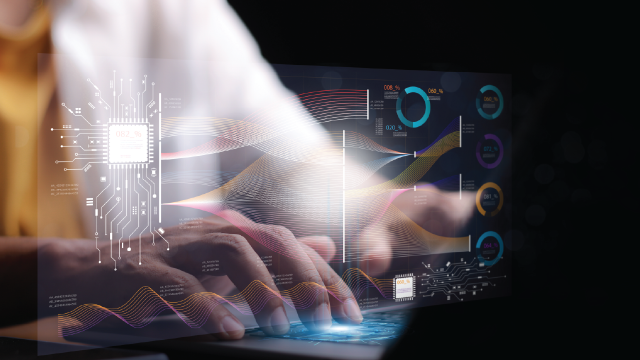
How we did this
Pew Research Center conducted this study to understand Americans’ views of artificial intelligence (AI) and its potential impact on people and society. For this analysis, we surveyed 5,023 adults from June 9 to 15, 2025. Everyone who took part in this survey is a member of the Center’s American Trends Panel (ATP), a group of people recruited through national, random sampling of residential addresses who have agreed to take surveys regularly. This kind of recruitment gives nearly all U.S. adults a chance of selection.
Interviews were conducted either online or by telephone with a live interviewer. The survey is weighted to be representative of the U.S. adult population by gender, race, ethnicity, partisan affiliation, education, presidential vote (among voters) and other factors. Read more about the ATP’s methodology.
Here are the questions used for this report, the topline and the survey methodology.
Key takeaways
- Americans are much more concerned than excited about the increased use of AI in daily life, with a majority saying they want more control over how AI is used in their lives.
- Far larger shares say AI will erode than improve people’s ability to think creatively and form meaningful relationships.
- At the same time, a majority is open to letting AI assist them with day-to-day tasks and activities.
- Most Americans don’t support AI playing a role in personal matters such as religion or matchmaking. They’re more open to AI for heavy data analysis, such as for weather forecasting and developing new medicines.
- Americans feel strongly that it’s important to be able to tell if pictures, videos or text were made by AI or by humans. Yet many don’t trust their own ability to spot AI-generated content.
Artificial intelligence tools are now playing a role in many aspects of life and society, spanning politics, the arts, work and beyond. While Americans express some openness to AI’s potential benefits, they’re concerned about its impact on some human abilities, according to a new Pew Research Center survey.
U.S. adults are generally pessimistic about AI’s effect on people’s ability to think creatively and form meaningful relationships: 53% say AI will worsen people’s ability to think creatively, compared with 16% who say it will improve this. An identical share (16%) says AI will make this skill neither better nor worse.
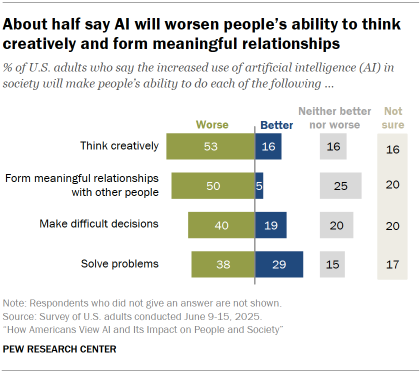
Far more say AI will worsen rather than improve people’s ability to form meaningful relationships (50% vs. 5%). One-quarter say AI won’t make this better or worse.
Americans are relatively more optimistic about AI improving problem-solving: 29% of U.S. adults say it will make people better at this skill. Still, a larger share (38%) says AI will make this worse.
Notably, sizable shares of U.S. adults are uncertain about these questions. Between 16% and 20% say they aren’t sure about whether AI will have a positive or negative impact on these human skills.
Building on our larger body of work tracking public opinion about AI’s societal impact, this study examines how Americans view AI’s effect on human abilities, as well as broader questions about AI’s impact on society. The survey, conducted among 5,023 U.S. adults from June 9 to 15, 2025, also updates our trends on Americans’ AI awareness and attitudes. In addition, in open-ended responses, survey respondents describe in their own words what they see as AI risks and benefits to society.
AI awareness and attitudes
Americans are forming impressions of AI at a time when nearly all U.S. adults (95%) say they have heard at least a little about it.

Overall, Americans continue to be wary about its broader impact:
- 50% say they’re more concerned than excited about the increased use of AI in daily life, up from 37% in 2021.
- 10% are more excited than concerned.
- 38% say they’re equally excited and concerned.
And more than half of Americans (57%) rate the societal risks of AI as high, compared with 25% who say the benefits of AI are high. When asked to describe in their own words why they rated the risks as high, the most common concern mentioned was about AI weakening human skills and connections.
In their own lives, about six-in-ten say they’d like more control over how AI is used, compared with 17% who are comfortable with their amount of control and 21% who are unsure. Still, nearly three-quarters say they’d be willing to let AI assist at least a little with day-to-day tasks and activities.
Detecting content created by AI versus humans
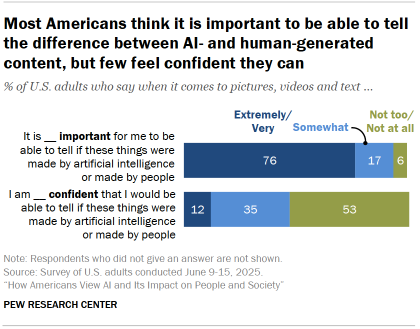
Related to Americans’ desire for more control over AI’s use, most Americans (76%) say it’s extremely or very important to be able to tell if pictures, videos and text were made by AI or people. But 53% of Americans are not too or not at all confident they can detect if something is made by AI versus a person.
Related: From political speeches to songs, how would Americans react if they found out AI was involved?
Views on AI playing different roles in society
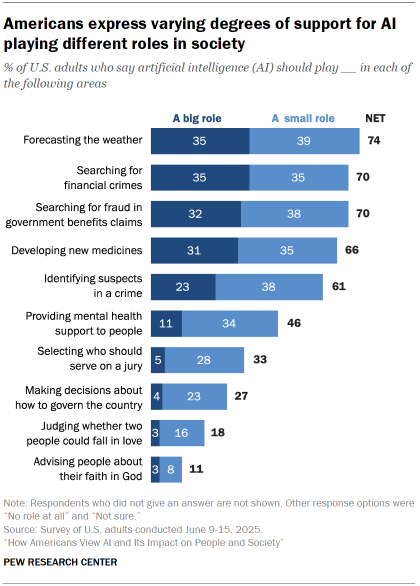
Similar to Americans’ concern about AI’s effect on people’s ability to form meaningful relationships, they largely do not see a role for AI in personal aspects of life such as matchmaking or religion. But there’s some receptiveness to AI doing heavy analytical tasks in the scientific, financial and medical realms.
Majorities say AI should play at least a small role in:
- Forecasting the weather (74%)
- Searching for financial crimes (70%)
- Searching for fraud in government benefits claims (70%)
- Developing new medicines (66%)
- Identifying suspects in a crime (61%)
And slightly less than half (46%) say this about AI providing mental health support to people.
In contrast, about two-thirds say AI should play no role in judging whether two people could fall in love. An even larger share (73%) says that AI should play no role in advising people about their faith in God.
Notably, no more than about one-third of Americans say AI should play a big role in any of the areas we asked about.
Young adults and AI
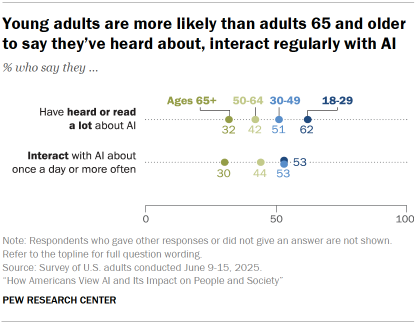
Young adults are far more likely to be aware of and interact often with AI compared with those ages 65 and older. For example, 62% of those under 30 say they have heard or read a lot about AI, compared with 32% of those ages 65 and older. This awareness gap has grown considerably since 2022.
Furthermore, majorities of adults under 30 say the increased use of AI in society will make people worse at thinking creatively (61%) and forming meaningful relationships with other people (58%). In comparison, about four-in-ten adults ages 65 and older say AI will make people worse in these areas.
Jump to more on: AI in Americans’ lives: Awareness, experiences and attitudes | Views on AI’s impact on society and human abilities | Americans on the risks, benefits of AI – in their own words
